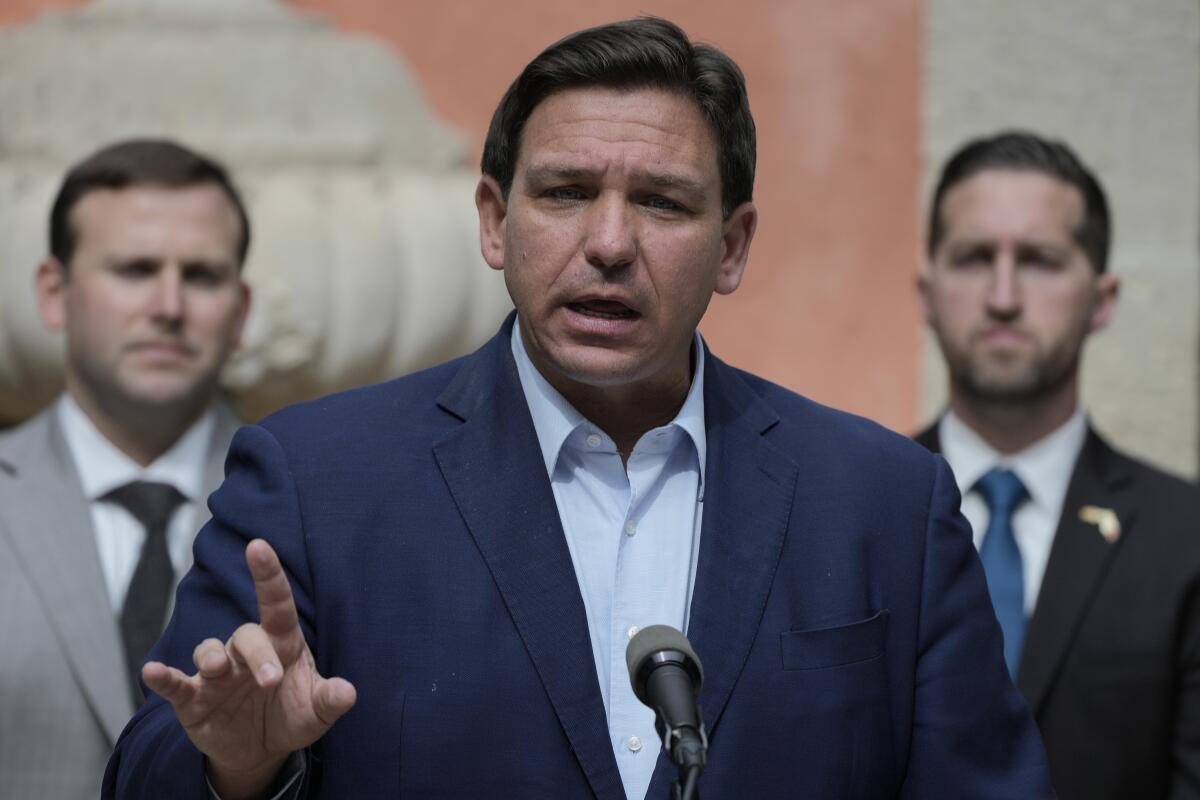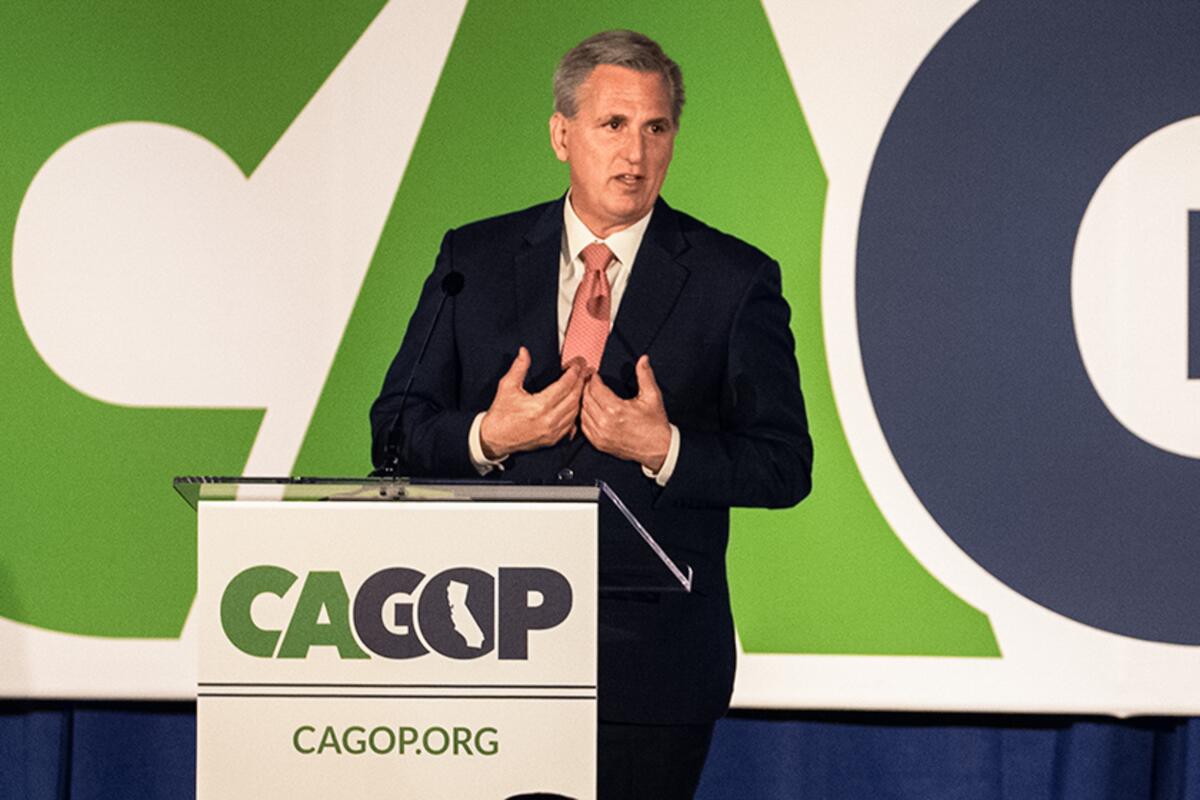Essential Politics: In picking a fight with Mickey Mouse, DeSantis is mimicking Trump

- Share via
One of my most memorable rites of passage growing up in Miami was “Grad Night,” an all-night party at Disney World for the state’s high school seniors. In my case, we danced and screamed as C+C Music Factory played “Gonna Make You Sweat.” (It was 1991 after all.)
Years later, when I worked at the Miami Herald, I wrote a lengthy feature on college students who pursued “theme park management” degrees at the University of Central Florida, the state’s biggest institution of higher learning.
Get our L.A. Times Politics newsletter
The latest news, analysis and insights from our politics team.
You may occasionally receive promotional content from the Los Angeles Times.
All of this is to say: Disney World is ingrained in the state’s identity, for better or worse, in ways that are hard to grasp for those outside Florida, or perhaps California, home of Disney Land.
Yes, they anoint a “butter queen” at the Minnesota State Fair and they tout the Tobacco Road college basketball rivalries in North Carolina. But you don’t see kids dressing up as pats of butter for Halloween or singing along with animatronic cigarettes to celebrate those home-state industries.
So why in the world would Gov. Ron DeSantis declare holy war on the church of Walt?
Ladies and gentlemen, boys and girls, welcome to Essential Politics. Much has been made of Disney World’s economic importance to Florida. Today I am going to explore why DeSantis is willing to breach the state’s emotional bond with the company.
Picking a fight with Mickey Mouse
A quick recap: DeSantis last week signed a law intended to eliminate Disney’s special governing district after the company paused political donations in the state to protest the controversial Parental Rights in Education bill that was on its way to passage. Critics have decried the measure as the “Don’t Say Gay” law because it bans discussing gender and sexual orientation for children in primary school. DeSantis signed it into law last month.
The old Republican Party would have found an accommodation with a major economic player such as Disney. That’s what former Vice President Mike Pence did in 2015 when he was governor of Indiana and agreed to amend a law that critics said would allow businesses to refuse service to gay people based on the owner’s religious beliefs.
But DeSantis and Florida Republicans showed no such hesitation in going after Mickey Mouse in a way that might require taxpayers to assume $1 billion of Disney’s debt and forgo the more than $100 million a year that the company spends on such services as police and fire.
So, why did DeSantis pick the fight in the first place?
Families of all political stripes attend the theme park in droves, and nostalgia for the place runs deep.
Republicans, in the theory, have also long opposed using regulations and taxing authority to penalize companies.
That political calculus changed with former President Trump. It wasn’t just his populist language or abandonment of some Republican principles. It was gut-level and emotional. He wanted to pick fights with people and companies that were the most popular, even among the Republican base, to make himself look powerful.
Many of us were shocked and baffled at first. How could an aspiring presidential nominee attack the late Sen. John McCain’s war heroism? Why would Trump go after the Bushes? The NFL? Even Fox News, the biggest conservative platform in the country?
The merits of the attacks were secondary to Trump and his supporters. The popularity of the victims was not just a bug but a feature.
That’s because, above all, Trump wanted to show himself as a tough guy, the words he uses as the ultimate sign of respect. Republicans, even those who found Trump’s personal behavior boorish, believed their party had been too polite in the past. They would never have to worry about that with Trump.
DeSantis, one of the most prominent Republicans trying to take the mantle from Trump, is modeling that behavior, hoping he too can show himself willing to take on sacred topiaries as he mulls a 2024 presidential run. He wants to stoke the culture wars, but he also wants to show he can be a tough guy.
It doesn’t hurt that Disney, which has attracted its share of criticism from across the political spectrum, is getting pummeled by conservative pundits and Fox News hosts who were upset at the company’s opposition to the Florida law forbidding sexual and gender identity instruction.
Their criticism has echoed long-running complaints from religious conservatives that the company has strayed inappropriately into politics and peddles progressive ideas. It’s no surprise that a recent YouGov poll found that 64% of Republicans believe the company too liberal.
We don’t know whether this fight will backfire. Voters in Central Florida, a crucial battleground in state and national elections, could see their property taxes go way up and rebel. Disney, long one of the most powerful players in state government, could exact revenge on DeSantis. The governor could back down under all this pressure.
Or DeSantis could simply lose, as it now appears he will. The Miami Herald and WESH 2 reported on Tuesday that Disney has assured its investors that the Legislature acted illegally because state law forbids dissolving the special district until the company’s debt is paid off. The company said it would not alter its current business practices, showing confidence it will win in court if necessary.
Recent history is littered with wannabe Trumps who failed in their attempts to copy his style.
But DeSantis, like Trump, sees a big reward in picking the risky fight: enshrinement in an enduring Disney World attraction, the Hall of Presidents.
Our daily news podcast
If you’re a fan of this newsletter, you’ll love our daily podcast “The Times,” hosted every weekday by columnist Gustavo Arellano, along with reporters from across our newsroom. Go beyond the headlines. Download and listen on our App, subscribe on Apple Podcasts and follow on Spotify.
The latest from the Supreme Court
— Supreme Court justices gave a skeptical hearing Tuesday to the Biden administration’s bid to repeal a Trump policy that requires tens of thousands of asylum seekers to wait in Mexico for their cases to be heard, David G. Savage reports. The court’s conservatives said they agreed with Texas state lawyers and Trump-appointed judges who ruled that U.S. immigration officials may not allow these migrants to enter this country.
— The court gave a mostly sympathetic hearing Monday to a former high school football coach whose prayers on the field may open the door for broader expression of religion in public schools, Savage writes. The court’s conservative justices said they were prepared to amend past strict rulings that said public schools and their employees may not “endorse” or promote religion.
— Also on Monday: The court cleared the way for a Virginia school board to admit more Black and Latino students — and slightly fewer Asian students — to a magnet high school for math and science. The justices, over three dissents from conservatives, agreed with a federal appeals court that the school board may use “race neutral” means, including family income, to admit more Black and Latino students.
Enjoying this newsletter? Consider subscribing to the Los Angeles Times
Your support helps us deliver the news that matters most. Become a subscriber.
The view from Washington
— Vice President Kamala Harris tested positive Tuesday for the coronavirus, but is not experiencing any symptoms, her office said. She “will isolate and continue to work from the vice president’s residence,” Kirsten Allen, her spokesperson, said in a statement.
— This week, billionaire Tesla founder Elon Musk bought Twitter, the favorite social media platform of the political establishment and American media, in a $44-billion deal. Musk centered his bid for Twitter on the premise that the social media company’s content moderation is too restrictive, prompting some conservatives to speculate that Trump and many of his allies could have bans lifted, reports Melanie Mason. Terry Castleman has a breakdown of which figures the platform has banned or heavily restricted.
— Newly revealed recordings of House Minority Leader Kevin McCarthy saying he would urge then-President Trump to resign from office in the aftermath of the Jan. 6 insurrection have sparked much political heat, but so far appear to not threaten the California Republican’s hold on power, nor his relationship with the former president, Nolan D. McCaskill and Arit John report.
— McCarthy alluded to that turmoil and attempted to head off criticism during a speech Saturday night at the California GOP convention, saying: “As we go out to earn this majority, they’re going to attack you, they’re going to attack me. They’re going to attack President Trump,” he said, speaking of Republican aims to win control of the House in the November election, Seema Mehta reports.

The view from California
— The most contentious and closely watched California election in 2022 is likely to be the race for attorney general, writes Hannah Wiley. For state Atty. Gen. Rob Bonta, who was appointed to the role last year, the timing of his first statewide campaign could be challenging — the race coincides with increased scrutiny of recent criminal justice reform efforts as his opponents seek to pin the blame for rising crime on Democrats.
— Also from Wiley: Battle lines have emerged in the debate over Gov. Gavin Newsom’s far-reaching and controversial effort to provide court-ordered treatment for homeless individuals with severe mental illness, with Democrats and local government officials divided as the plan faced its first public hearing.
— The California Republican Party endorsed state Sen. Brian Dahle for governor on Sunday, Mehta reports. While Dahle ultimately received the votes to win the endorsement, it was not without controversy amid news that his wife’s Assembly committee transferred $40,500 to the state party.
Sign up for our California Politics newsletter to get the best of The Times’ state politics reporting.
Stay in touch
Keep up with breaking news on our Politics page. And are you following us on Twitter at @latimespolitics?
Did someone forward you this? Sign up here to get Essential Politics in your inbox.
Until next time, send your comments, suggestions and news tips to politics@latimes.com.
Get the L.A. Times Politics newsletter
Deeply reported insights into legislation, politics and policy from Sacramento, Washington and beyond. In your inbox twice per week.
You may occasionally receive promotional content from the Los Angeles Times.




